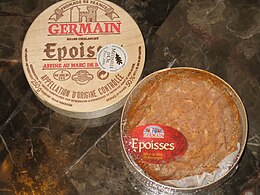Époisses de Bourgogne
| Époisses | |
|---|---|
 |
|
| Country of origin | France |
| Region, town | Côte-d'Or, Époisses |
| Source of milk | Cows |
| Pasteurized | Some |
| Texture | Soft, washed rind |
| Aging time | at least six weeks |
| Certification | French AOC 1991 |
Époisses de Bourgogne is a legally-demarcated cheese made in the village Époisses and its environs, in the département of Côte-d'Or, about halfway between Dijon and Auxerre, in the former duchy of Burgundy, France, from agricultural processes and resources traditionally found in that region.
Commonly referred to as Époisses, it is a pungent soft-paste cows-milk cheese. Smear-ripened, 'washed rind' (washed in brine and marc de Bourgogne, the local pomace brandy), it is circular at around either 10 cm (3.9 in) or 18 cm (7.1 in) in diameter, with a distinctive soft red-orange color. It is made either from raw or pasteurized milk. It is sold in a circular wooden box, and in restaurants, is sometimes served with a spoon due to its extremely soft texture. The cheese is often paired with Trappist beer or even Sauternes rather than a red wine.
At the start of the sixteenth century, the village was home to a community of Cistercians at L'Abbaye de Citeaux that, according to oral legend, began production of the cheese. Two hundred years later, when the community left, local farmers inherited the recipe, which developed over the next century. Napoleon was a particular fan of the cheese, and the famous epicure Brillat-Savarin himself classed it as the "king of all cheeses".
Although popular at the start of the 20th century, with over 300 farms manufacturing the cheese, production had all but died out by the end of the Second World War. This resulted from the loss of a significant portion of the male population, leaving the women to work the fields, which in turn led to the neglect of the local dairy businesses and cheese-making.
In 1956 a pair of small farmers, Robert and Simone Berthaut, decided to re-launch the production of Époisses by mobilizing the traditional skills of those who still knew how to make the cheese. Berthaut Époisses increasingly gained favor among its devotees and became a spectacular success. The business is now carried on by their son, Jean Berthaut. Fromagerie Berthaut is currently responsible for the manufacture of all fermier Époisses, although several artisanal fromageries now manufacture the cheese.
...
Wikipedia
